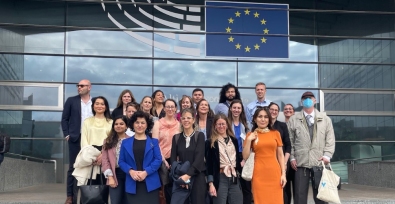Rama is six months pregnant and worried about giving birth to her child. She’s just 22, earning a living by picking tea leaves on a plantation in Assam in northeast India.
Even if she feels pain during work, she does not take a break, and in the remote tea plantation, medical care is scarce.
Take Action: Ask Tea Brands “Who Picked My Tea?”
Workers like Rama earn just Rs 1000, or $14, a week, and are under intense pressure to meet daily quotas of 24 kilograms of tea leaves. If they cannot hit their quotas, their pay is cut.
CNN reports:
Casual laborers often work throughout their pregnancy and rarely attend hospital appointments because they cannot afford to give up even a day’s wages.
“It is difficult, but work is work, I have to do it,” said Rama, adding that taking breaks is frowned upon and often results in a scolding from her supervisor.
She explained how she walks slowly to work these days, but with caution. “When they see us resting, they ask, ‘who will pay for your wages?'”
Rama admits she is largely unaware of the health care needed to keep her baby healthy. Women are often in need of supplements and blood transfusions, but are just too far away to get it, or to be informed.
One tea plantation owner admitted that medical problems facing pregnant employees, like excessive bleeding, are things the company cannot control, but “whatever we can do, we do.”
The Indian Tea Association pointed out that legally “workers are eligible for primary health care as per the Plantation Labour Act.” Under this, pregnant women can access maternity care including anemia treatment, immunization, institutional deliveries, and mother and child care projects.
But the claim that maternity care is accessible to all workers is debatable. Rama said the one ambulance on her tea plantation takes a long time to arrive and is always busy with patients. Sometimes, she says, “it even goes out of the town.”
“If you look at the infrastructure on the ground, it is not enough,” explained human rights lawyer Jayshree Satpute.
“There are not enough doctors, the hospitals do not have enough facilities, not enough beds, the primary health centers do not have enough infrastructure.”







Freedom United is interested in hearing from our community and welcomes relevant, informed comments, advice, and insights that advance the conversation around our campaigns and advocacy. We value inclusivity and respect within our community. To be approved, your comments should be civil.
“issues or problems, you shouldn’t have kids”. You have no concept of third world poverty or cultural differences. while you may have done physical labor, I guarantee you have no idea what it is to work a 10 hour day picking leaves non stop.
Are you from a first world country? Was your pay wasn’t cut because you couldn’t meet the daily quota? Then you have no say! You’re lucky you live in a first world country where you have access to hospitals, doctors, nurses to take care of your stupid butt. This is a third world country that doesn’t have the same privilege you have! Get over yourself!
I’d like to know what tea companies employ these women. They deserve better working conditions.
I know I will get a lot of grief for this but jeez I worked 24/7 when I was pregnant with my first son! And I did physical work. She is 22. I also could not afford health care and no ultra sound etc. I paid for my midwife myself and I did give birth in a hospital but even then was in and out less the half a day since again I was responsible. We need to fix what is broken here first! And pregnancy is not a disease. I also think if you have issues or problems then… Read more »